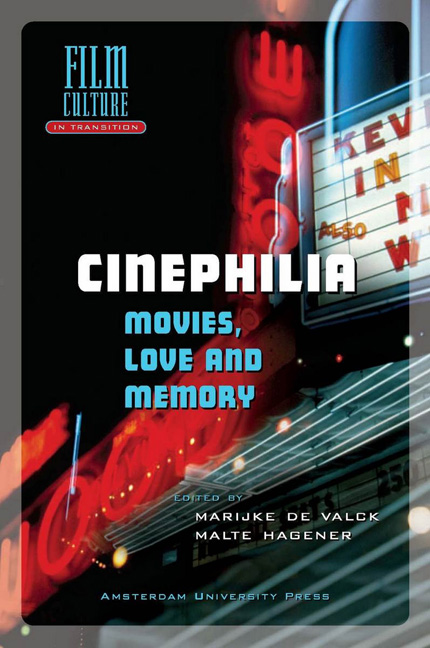Book contents
Down with Cinephilia? Long Live Cinephilia? And Other Videosyncratic Pleasures
Published online by Cambridge University Press: 25 January 2021
Summary
Cinephilia in the New Media Age
From a historical perspective, the term cinephilia is Janus-faced. On the one hand, it alludes to the universal phenomenon that the film experience evokes particular sensations of intense pleasure resulting in a strongly felt connection with the cinema, often described as a relation of love. Cinephiles worldwide continue to be captured and enraptured by the magic of moving images. They cherish personal moments of discovery and joy, develop affectionate rituals, and celebrate their love in specialized communities. On the other hand, the term covers practices and discourses in which the term cinephilia is appropriated for dogmatic agendas. The most successful of these practices has beyond question been the “politique des auteurs.” Colin MacCabe points out that the “politique des auteurs” was not only concerned with establishing the primacy of the filmmaker- director, but also aimed at the creation of a new “perfect” audience. When watching Hollywoodfilms, the young French film critics Truffaut, Godard, Rohmer, and companions discovered they had passionate preferences for certain filmmakers, mostly popular Hollywood directors, which they consequently set out to legitimize in their writings in Cahiers du Cinéma. It is this discourse that MacCabe credits with the construction of an “omniscient cinéphile” archetype that became central to the (elitist) mode of film reception known as cinephilia.
Initiated in the 1950s, cinephilia came to full bloom in the 1960s thanks to the success of the Nouvelle Vague in France and abroad, but also the lively debates in the film magazines Positif, Cahiers du Cinéma and the discussions by the cinephiles congregating around the Cinema MacMahon and other Parisian movie houses. It is here at this possible point of origin (there are other moments one could single out as foundational) that cinephilia presents its double nature: it dotes on the most popular genre film(maker)s of the most popular national film industry, yet it does so in a highly idiosyncratic, elitist, and often counterintuitive fashion. Cinephilia in its French attire of the 1960s is simultaneously democratic since it takes a popular cultural form very seriously while also being snobbishly aristocratic about it because it replaces traditional hierarchies (in which film was found at the lower end of the continuum) with new, similarly dogmatic taste preferences.
- Type
- Chapter
- Information
- CinephiliaMovies, Love and Memory, pp. 11 - 24Publisher: Amsterdam University PressPrint publication year: 2005
- 5
- Cited by



